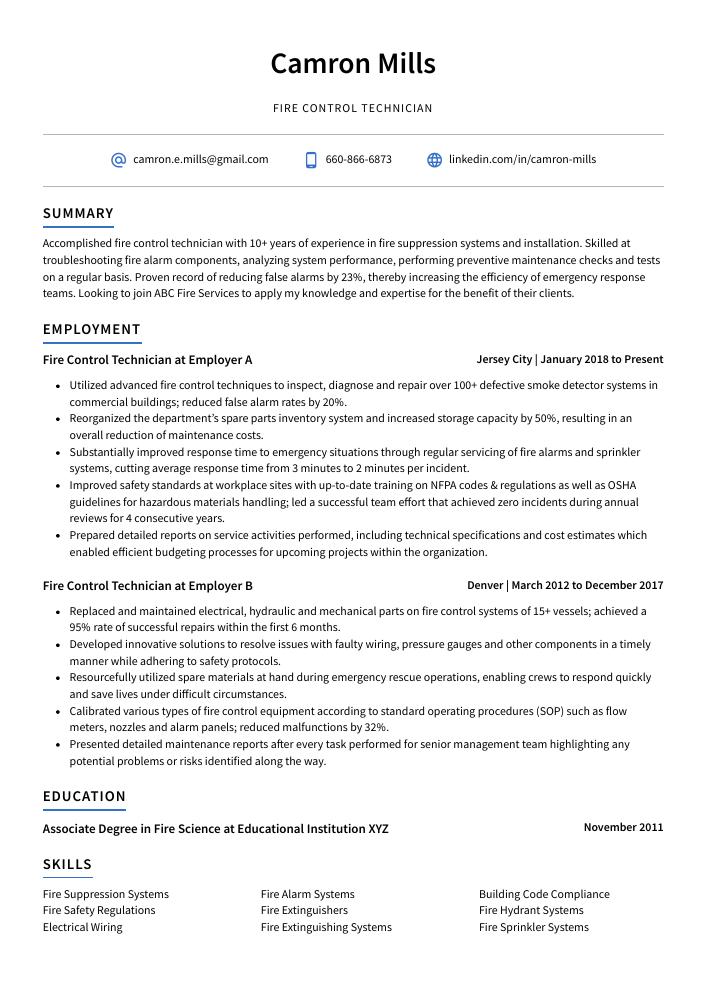Fire Control Technician Resume Guide
Fire Control Technicians are responsible for maintaining, operating and testing fire control systems on various military vessels. They inspect the equipment to ensure it is in proper working order, make repairs when necessary, and monitor the performance of any automated system that helps detect or extinguish fires. Additionally they provide instruction to personnel regarding safety procedures related to fire control operations.
You have the expertise to monitor and control fire safety systems like a professional, yet potential employers don’t know who you are. To make them aware of your qualifications, you must write an impressive resume that highlights your experience.
This guide will walk you through the entire process of creating a top-notch resume. We first show you a complete example and then break down what each resume section should look like.
Table of Contents
The guide is divided into sections for your convenience. You can read it from beginning to end or use the table of contents below to jump to a specific part.
Fire Control Technician Resume Sample
Camron Mills
Fire Control Technician
[email protected]
660-866-6873
linkedin.com/in/camron-mills
Summary
Accomplished fire control technician with 10+ years of experience in fire suppression systems and installation. Skilled at troubleshooting fire alarm components, analyzing system performance, performing preventive maintenance checks and tests on a regular basis. Proven record of reducing false alarms by 23%, thereby increasing the efficiency of emergency response teams. Looking to join ABC Fire Services to apply my knowledge and expertise for the benefit of their clients.
Experience
Fire Control Technician, Employer A
Jersey City, Jan 2018 – Present
- Utilized advanced fire control techniques to inspect, diagnose and repair over 100+ defective smoke detector systems in commercial buildings; reduced false alarm rates by 20%.
- Reorganized the department’s spare parts inventory system and increased storage capacity by 50%, resulting in an overall reduction of maintenance costs.
- Substantially improved response time to emergency situations through regular servicing of fire alarms and sprinkler systems, cutting average response time from 3 minutes to 2 minutes per incident.
- Improved safety standards at workplace sites with up-to-date training on NFPA codes & regulations as well as OSHA guidelines for hazardous materials handling; led a successful team effort that achieved zero incidents during annual reviews for 4 consecutive years.
- Prepared detailed reports on service activities performed, including technical specifications and cost estimates which enabled efficient budgeting processes for upcoming projects within the organization.
Fire Control Technician, Employer B
Denver, Mar 2012 – Dec 2017
- Replaced and maintained electrical, hydraulic and mechanical parts on fire control systems of 15+ vessels; achieved a 95% rate of successful repairs within the first 6 months.
- Developed innovative solutions to resolve issues with faulty wiring, pressure gauges and other components in a timely manner while adhering to safety protocols.
- Resourcefully utilized spare materials at hand during emergency rescue operations, enabling crews to respond quickly and save lives under difficult circumstances.
- Calibrated various types of fire control equipment according to standard operating procedures (SOP) such as flow meters, nozzles and alarm panels; reduced malfunctions by 32%.
- Presented detailed maintenance reports after every task performed for senior management team highlighting any potential problems or risks identified along the way.
Skills
- Fire Suppression Systems
- Fire Alarm Systems
- Building Code Compliance
- Fire Safety Regulations
- Fire Extinguishers
- Fire Hydrant Systems
- Electrical Wiring
- Fire Extinguishing Systems
- Fire Sprinkler Systems
Education
Associate Degree in Fire Science
Educational Institution XYZ
Nov 2011
Certifications
Fire Alarm Systems Technician Certification
National Institute for Certification in Engineering Technologies
May 2017
1. Summary / Objective
Your resume summary/objective should provide an overview of your experience and qualifications as a fire control technician. This is where you can highlight the most important aspects of your career, such as the number of years you have been in this field, any certifications or training courses related to fire safety that you have completed, and how many successful projects/systems you have implemented.
Below are some resume summary examples:
Talented and experienced fire control technician with 8+ years of experience in the field. Experienced in monitoring and controlling fires, installing, repairing and testing fire protection systems, performing inspections on equipment for safety compliance, troubleshooting system malfunctions and training personnel on proper operation. Seeking a position at ABC Fire Solutions to utilize my skillset to ensure optimal performance of all company firefighting services.
Well-rounded Fire Control Technician with 6+ years of experience in the fire control industry. Focused on designing and maintaining numerous fire protection systems for residential, commercial, and industrial sites. At XYZ Corporation, managed all aspects of projects from concept to installation while adhering to code requirements and budget constraints. Received Departmental Excellence award for creating a more efficient system design that reduced costs by 20%.
Reliable fire control technician with over 8 years of experience in fire prevention and suppression. Experienced in inspecting, maintaining, repairing, and testing fire safety systems to ensure compliance with local regulations. At XYZ Fire Station I was responsible for developing emergency response plans for up to 50 personnel per shift. Skilled at using advanced computer-aided design software for creating detailed diagrams of fire protection systems.
Amicable fire control technician with 5+ years of experience in monitoring, maintaining, and troubleshooting fire protection systems. Successfully completed over 100 maintenance checks for ABC Fire Suppression Systems; identified system faults and took corrective action to ensure efficient operations. Received “Employee of the Month” award twice during tenure at XYZ. Aiming to leverage skillset to provide a safe environment at your organization.
Enthusiastic fire control technician with 5+ years of experience in fire safety and prevention. Expertise includes monitoring systems, conducting maintenance, testing equipment for proper functioning, and training teams on best practices to ensure compliance with applicable regulations. Seeking to join ABC Company as a Fire Control Technician to help keep their facilities safe from potential hazards.
Seasoned Fire Control Technician with 8+ years of experience maintaining fire control systems for commercial and residential customers. Proven success in troubleshooting, repair, and installation of fire protection equipment. Seeking to leverage technical aptitude and customer service skills as a Fire Control Technician at ABC Company to ensure optimal performance of the company’s product portfolio.
Dependable fire control technician with 5+ years of experience in installing and maintaining fire protection systems. Certified by the NFPA as a Fire Control Technician, with proven proficiency in reading blueprints and interpreting building codes. Seeking to join ABC Company to use advanced technical knowledge and troubleshooting skills to ensure the safety of people, property, and buildings.
Committed fire control technician with 6+ years of experience in the firefighting field. Successfully operated and maintained advanced systems including sprinkler, alarm, extinguisher, smoke detection and suppression equipment on a daily basis. Seeking to join ABC Fire Solutions as an expert in fire protection technology to help ensure safety for clients across the globe.
2. Experience / Employment
The work history/experience section is where you talk about your past employment. This should be written in reverse chronological order, meaning the most recent job is listed first.
Stick to bullet points when describing what you did; this makes it easier for the reader to quickly take in information. When writing these bullet points, make sure that they are detailed and include quantifiable results achieved if possible.
For example, instead of saying “Monitored fire control systems,” you could say, “Maintained a 98% uptime rate on all fire control systems by performing regular maintenance checks and troubleshooting any issues.”
To write effective bullet points, begin with a strong verb or adverb. Industry specific verbs to use are:
- Monitored
- Inspected
- Operated
- Calibrated
- Troubleshot
- Repaired
- Installed
- Tested
- Adjusted
- Programmed
- Replaced
- Assembled
- Analyzed
- Maintained
- Documented
Other general verbs you can use are:
- Achieved
- Advised
- Assessed
- Compiled
- Coordinated
- Demonstrated
- Developed
- Expedited
- Facilitated
- Formulated
- Improved
- Introduced
- Mentored
- Optimized
- Participated
- Prepared
- Presented
- Reduced
- Reorganized
- Represented
- Revised
- Spearheaded
- Streamlined
- Structured
- Utilized
Below are some example bullet points:
- Spearheaded the installation, maintenance and repair of fire control systems in 40+ buildings, ensuring that all safety protocols were followed to the letter.
- Coordinated with other departments within Fire Control team to install smoke detectors & sprinkler systems; reduced false alarms by 45%.
- Reduced risk of fire hazards through rigorous testing of existing alarm/control systems and scheduled preventative maintenance programs on an ongoing basis.
- Proficiently programmed advanced computerized equipment for controlling automated HVAC, electrical and security functions throughout building sites across the city.
- Participated in extensive training sessions covering topics such as NFPA codes & guidelines, OSHA regulations and safe work practices; completed certification coursework ahead of schedule.
- Documented and evaluated all fire control system parameters to ensure compliance with NFPA codes and standards; improved accuracy by 15%.
- Mentored 3 new technicians in performing maintenance on electrical systems, sprinkler systems, fire alarms and other associated devices in the building.
- Represented the company at several industry-related conferences as a subject matter expert on fire protection technologies and practices; won Best Presentation award at Fire Protection Summit 2019.
- Competently performed preventive maintenance tasks such as testing smoke detectors, inspecting alarm systems & replacing defective equipment on time each month; reduced service callbacks by 25%.
- Repaired faulty components of over 500 different types of advanced fire suppression/detection products for clients within 24 hours after diagnosis; saved up to $5000 annually through cost-effective repairs instead of replacements.
- Facilitated the maintenance of fire control systems and components, including conducting detailed inspections on over 150 pieces of equipment to ensure optimal functioning.
- Adjusted settings in alarm systems and performed complex repairs to minimize false alarms; reduced response time for emergency calls by 45%.
- Assembled new parts into existing fire control networks according to manufacturer specifications, while troubleshooting any technical issues that arose during installation processes.
- Introduced automated testing procedures which helped detect potential problems with the system before they caused significant damage; improved safety ratings by 30% at all sites monitored with this technology.
- Actively provided timely customer service support pertaining to the operation, installation and repair of fire detection devices as well as other preventive measures; responded to a total of 250 requests within 24 hours or less per month for two consecutive years straight.
- Optimized fire control systems for over 300 buildings, increasing efficiency by 10% and reducing response time to emergency situations by 20%.
- Achieved a 100% success rate in fire drills conducted at all sites, ensuring safety protocols were properly followed at all times.
- Diligently inspected fire suppression equipment and alarm detection devices on a weekly basis; identified potential hazards before they became an issue, averting costly repairs or replacements of faulty parts 95% of the time.
- Demonstrated aptitude in troubleshooting issues with smoke detectors & alarms as well as preventing false alarms caused by unintentional triggers like cooking fumes etc., resolving problems within 15 minutes on average without disruption to operations or customer service levels.
- Formulated training programs for staff members regarding correct usage of extinguishers & other emergency tools during fires; reduced evacuation times from 25 minutes down to 8-10 minutes across 30+ locations through successful implementation strategies.
- Programmed fire control systems for over 100 residential, commercial and industrial buildings, resulting in a 30% decrease of false alarms.
- Advised clients on the use of fire alarm detectors and sprinkler systems to ensure compliance with safety regulations; conducted regular inspections that reduced potential hazards by 75%.
- Operated complex computer-based software programs to monitor building security networks and supervised upgrades as needed, reducing maintenance costs by $4,000 annually.
- Expedited installation projects by designing intuitive wiring diagrams according to customer specifications within 24 hours; saved up to 10 labor hours per job site project while ensuring accuracy at all times.
- Reliably maintained daily logs of system performance cycles which enabled early detection of problems before they became major issues; minimized downtime from 2 days/month average down to 1 day/quarter average without delay or failure.
- Tested and inspected fire protection systems, equipment and components to ensure they met local and state codes; minimized false alarms by 20%.
- Compiled detailed reports on the condition of all suppression systems installed in commercial buildings, ensuring that safety standards were consistently maintained.
- Structured a preventative maintenance program for over 400 fire alarm panels and sprinkler heads across 3 sites, reducing repair costs by $1,500 annually.
- Conducted regular training with staff members on proper use of emergency exit signs & evacuation plans while also providing guidance when faced with potential hazardous situations or fires outbreaks.
- Consistently kept up-to-date records of servicing/repairs done on all types of active Fire Control Systems including hydrants, detectors & extinguishers; improved accuracy rate from 94% to 99%.
- Assessed fire and water control systems in commercial and residential buildings, ensuring that all safety protocols were adhered to; reduced emergency response time by 50% within the first quarter.
- Analyzed building plans, blueprints, specifications and inspection reports on a daily basis to identify any maintenance or repair requirements for fire protection equipment such as alarms, sprinklers & extinguishers.
- Troubleshot defective fire suppression systems including pumps, valves and pipes using specialized tools & instruments; completed repairs with minimal downtime of 4 hours per system on average.
- Streamlined testing procedures of smoke detectors and heat sensors according to local fire codes while maintaining thorough documentation records throughout service calls; decreased defect rate by 20%.
- Thoroughly inspected each site upon completion of work orders to confirm proper functioning without compromising on quality standards set forth by governing bodies such as OSHA & NFPA regulations.
- Monitored and tested fire control systems, including sprinkler systems, dampers and smoke detectors in multiple buildings; achieved 100% compliance rate with regulatory standards.
- Revised existing blueprints to incorporate new fire safety elements into structures during building renovations; improved overall structural integrity by 10%.
- Maintained 45+ pieces of equipment used for inspecting and testing the operation of hydraulic pumps, mains valves and other components within a range of fire protection systems.
- Installed over 30 high-tech alarm panels & associated devices on site as part of an ongoing construction project across 3 facilities; completed installations ahead of schedule by 8 weeks at no extra cost to the client.
- Independently responded to residential/commercial fires using state-of-the art extinguishing media such as dry powder chemicals or foam compounds depending on nature/severity of blaze; reduced property damage costs by $500K annually due to swift action taken in emergency scenarios.
3. Skills
Even though two organizations are hiring for the same role, the skillset they want an ideal candidate to possess could differ significantly. For instance, one may be on the lookout for an individual with experience in installing and maintaining fire detection systems, while the other may be looking for an individual with knowledge of various fire protection codes.
It is essential to tailor your skills section according to each job you are applying for; this will help ensure that applicant tracking systems (which employers use to scan resumes) pick up on all relevant keywords.
In addition, it would also be beneficial if you could provide more detail about some of these skills/qualifications throughout your resume – such as in the summary or work history sections.
Below is a list of common skills & terms:
- Building Code Compliance
- Electrical Wiring
- Fire Alarm Systems
- Fire Extinguishers
- Fire Extinguishing Systems
- Fire Hydrant Systems
- Fire Safety Regulations
- Fire Sprinkler Systems
- Fire Suppression System Maintenance
- Fire Suppression Systems
4. Education
Including an education section on your resume will depend on how far along you are in your career. If you just graduated and have no work experience, it is important to list the relevant courses and qualifications related to fire control technician roles below your resume objective. However, if you have significant work experience that demonstrates a strong background in fire control technology, including an education section may be unnecessary.
If an education section is included, try to mention courses and subjects related specifically to the role of a fire control technician such as electrical engineering or automation systems design.
Associate Degree in Fire Science
Educational Institution XYZ
Nov 2011
5. Certifications
Certifications are a great way to demonstrate your expertise in a certain field. They show potential employers that you have the necessary skills and knowledge required for the job, as well as prove that you are committed to staying up-to-date with industry trends.
If there is an important certification related to the position you are applying for, make sure it is included on your resume so hiring managers can see how qualified you really are!
Fire Alarm Systems Technician Certification
National Institute for Certification in Engineering Technologies
May 2017
6. Contact Info
Your name should be the first thing a reader sees when viewing your resume, so ensure its positioning is prominent. Your phone number should be written in the most commonly used format in your country/city/state, and your email address should be professional.
You can also choose to include a link to your LinkedIn profile, personal website, or other online platforms relevant to your industry.
Finally, name your resume file appropriately to help hiring managers; for Camron Mills, this would be Camron-Mills-resume.pdf or Camron-Mills-resume.docx.
7. Cover Letter
Including a cover letter when sending your resume is an effective way to make a great first impression on potential employers. It provides you with the opportunity to showcase more of your personality and skills, that may not necessarily be included in your CV.
A cover letter should typically consist of 2-4 paragraphs and include information such as why you’re applying for the role, what makes you unique compared to other candidates and how their organization would benefit from hiring someone like yourself. Writing one can help demonstrate that extra effort was put into the application process – helping set you apart from everyone else who applied!
Below is an example cover letter:
Dear Margarete,
I am writing to apply for the Fire Control Technician position at ABC Corporation. As a certified firefighter and experienced control technician, I am confident that I would be a valuable asset to your team.
In my current role as Fire Control Technician at XYZ Corporation, I maintain and repair fire control equipment such as sprinklers, alarms, and extinguishers. I also conduct regular inspections of fire control systems to ensure they are in compliance with local codes and regulations. In addition, I have experience responding to emergency situations and providing support during firefighting operations.
My training and experience have provided me with the skills necessary to excel in this role. In addition, my strong attention to detail ensures that all repairs are made correctly the first time around. My ability to work well under pressure is another asset that would benefit your organization during an emergency situation.
I am eager to utilize my skills and experience in a new environment and contribute to the success of ABC Corporation’s fire safety program. Thank you for your time and consideration; I look forward to hearing from you soon about this opportunity.
Sincerely,
Camron
Fire Control Technician Resume Templates
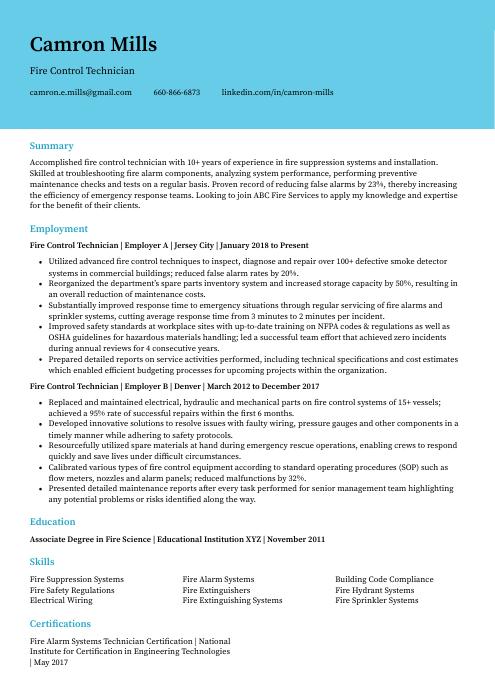 Dugong
Dugong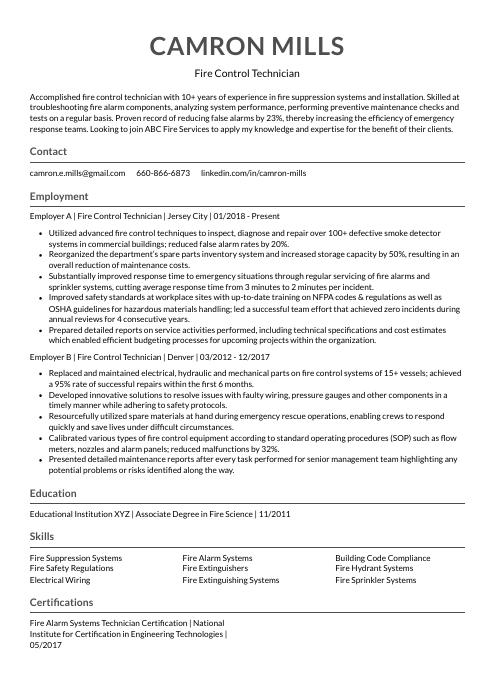 Indri
Indri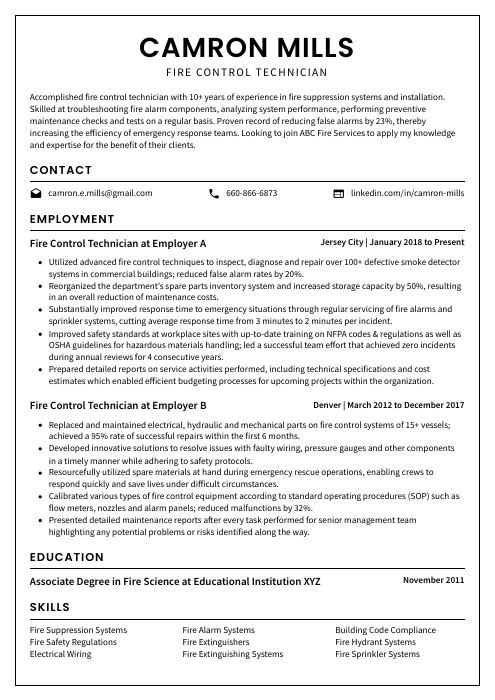 Cormorant
Cormorant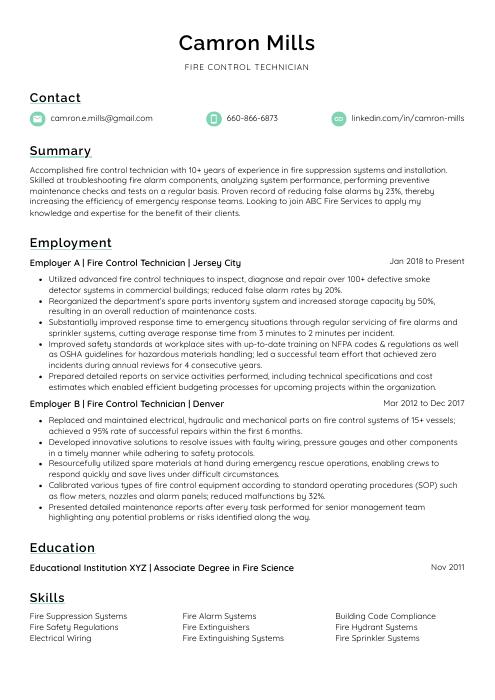 Lorikeet
Lorikeet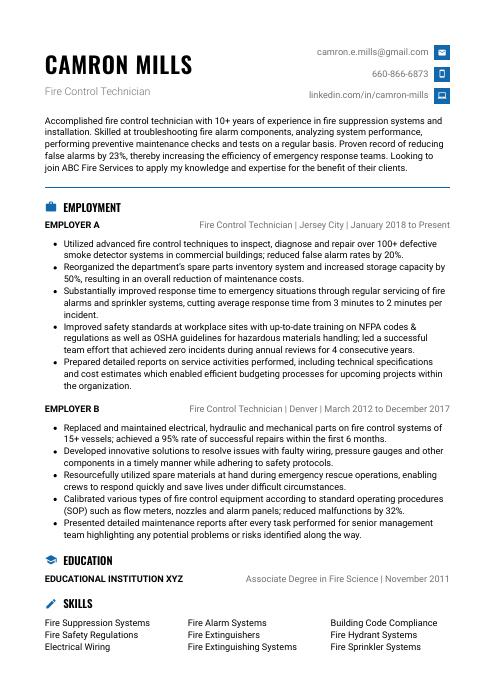 Echidna
Echidna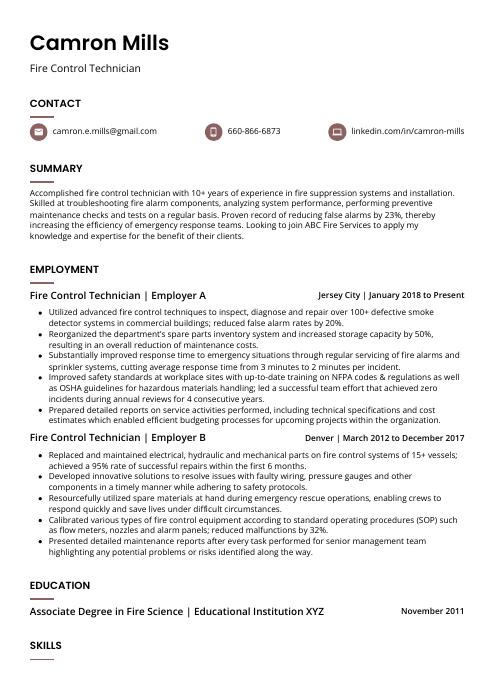 Fossa
Fossa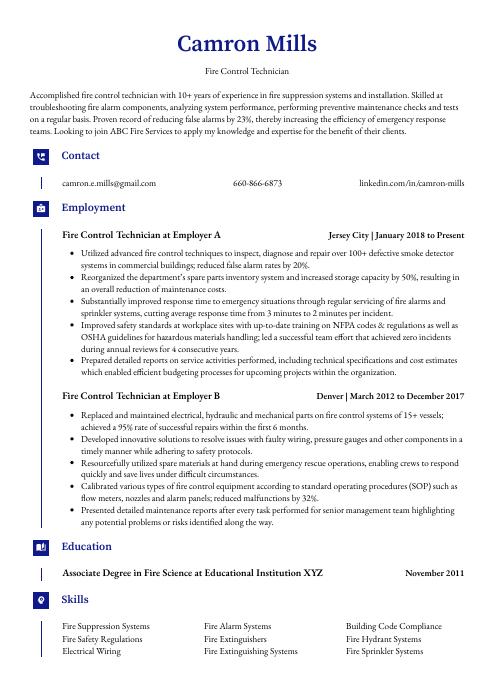 Gharial
Gharial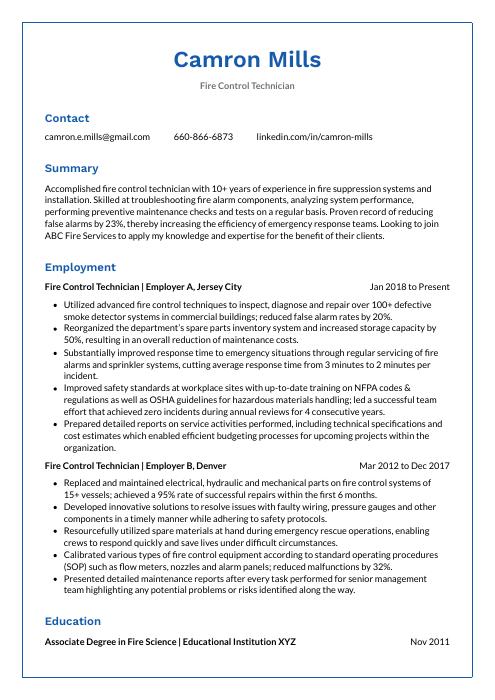 Markhor
Markhor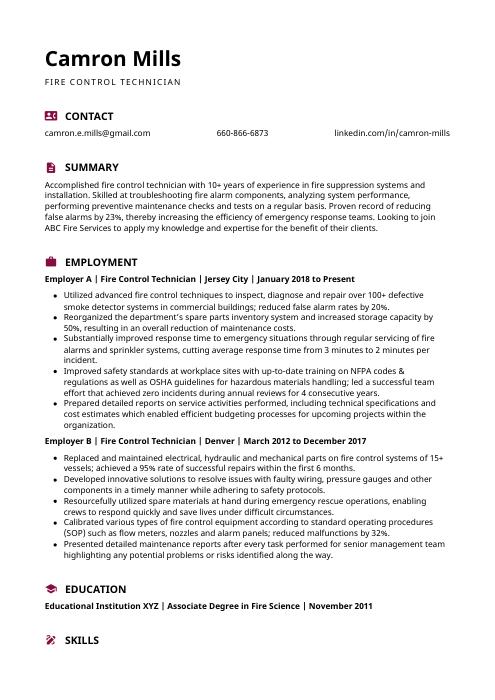 Hoopoe
Hoopoe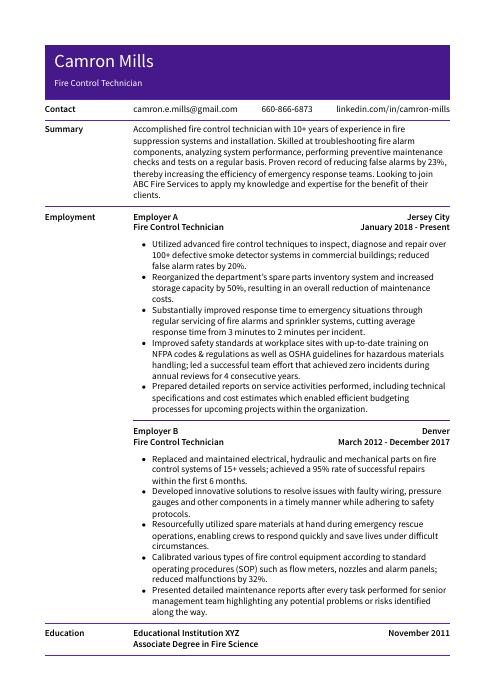 Pika
Pika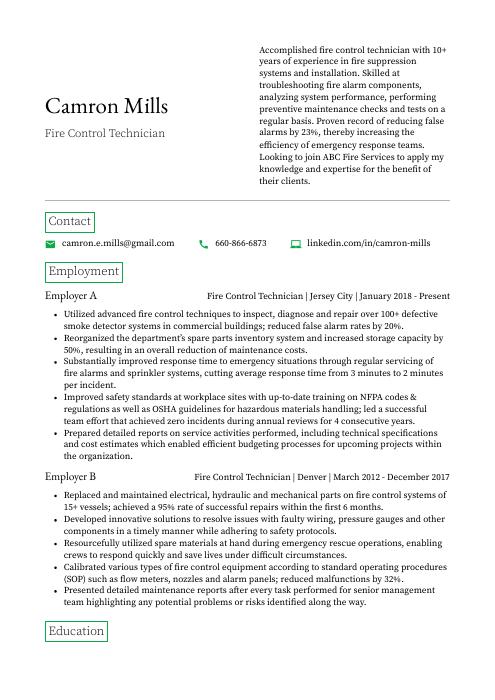 Quokka
Quokka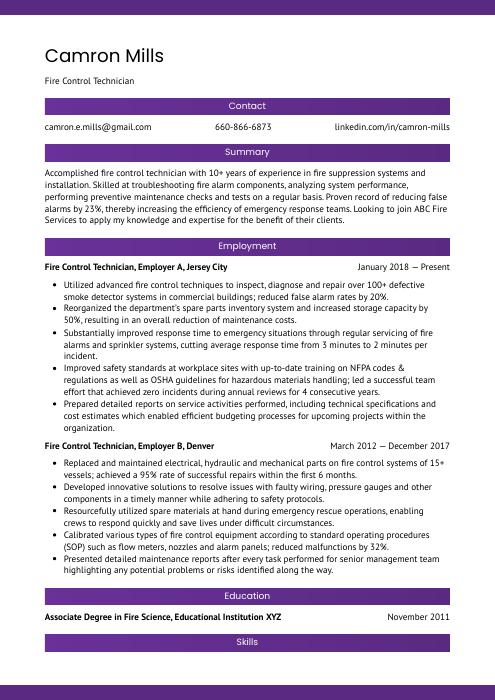 Jerboa
Jerboa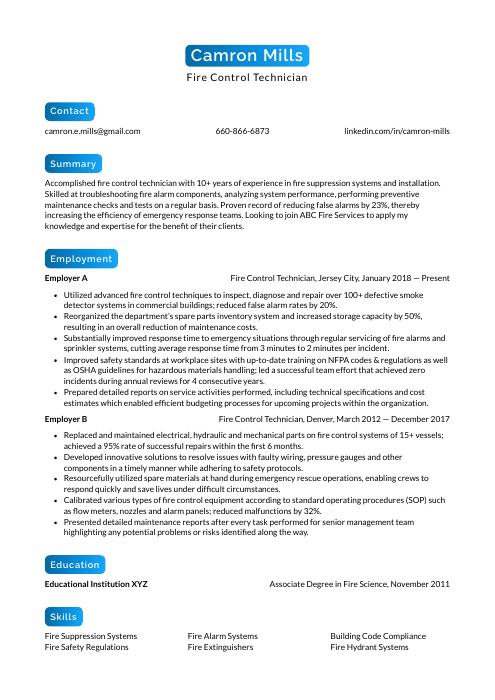 Kinkajou
Kinkajou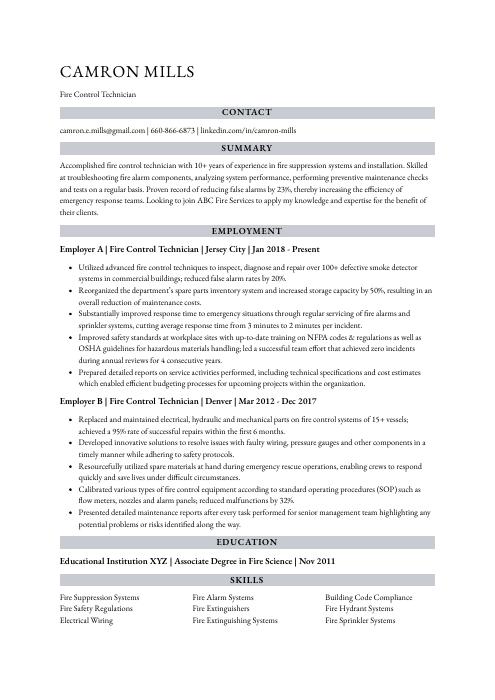 Numbat
Numbat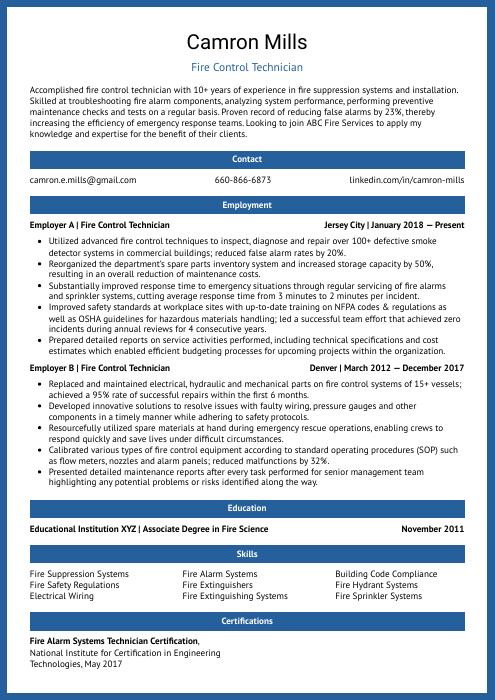 Ocelot
Ocelot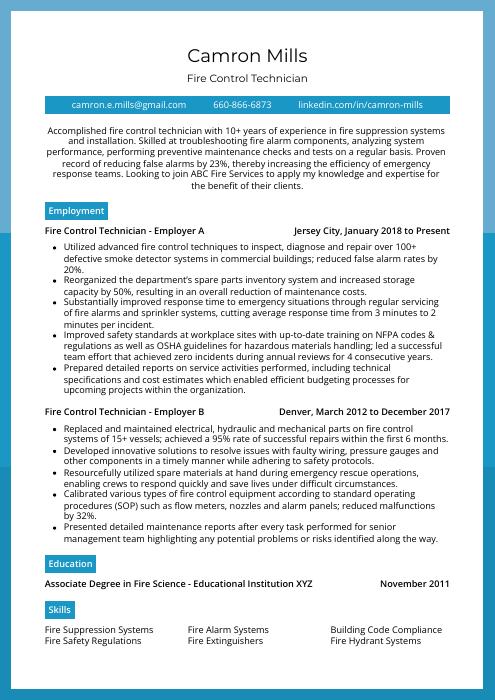 Rhea
Rhea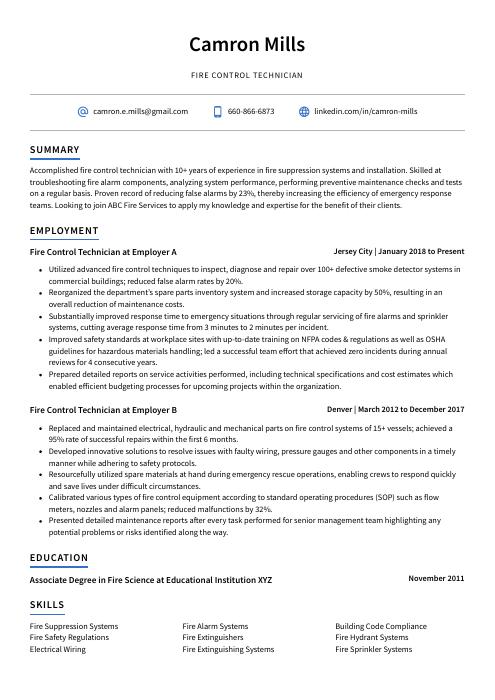 Axolotl
Axolotl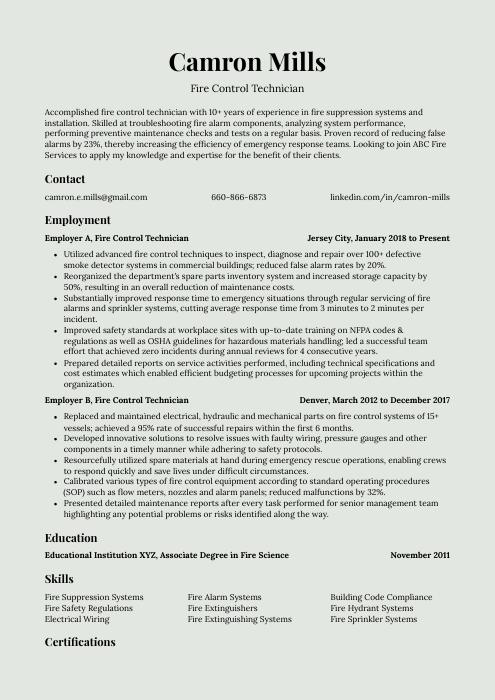 Saola
Saola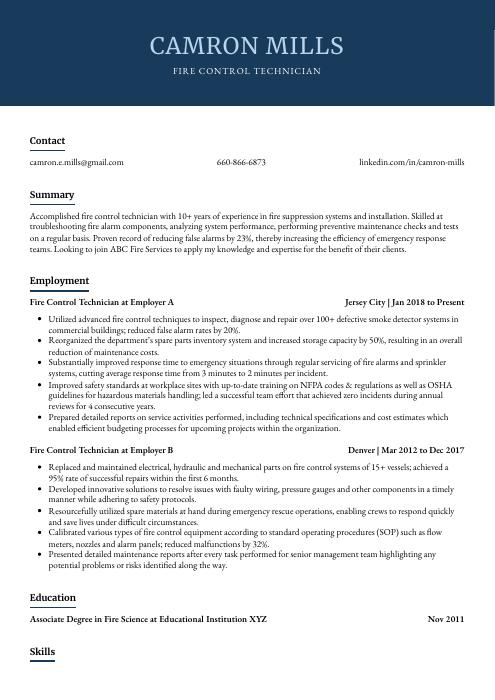 Bonobo
Bonobo Rezjumei
Rezjumei
